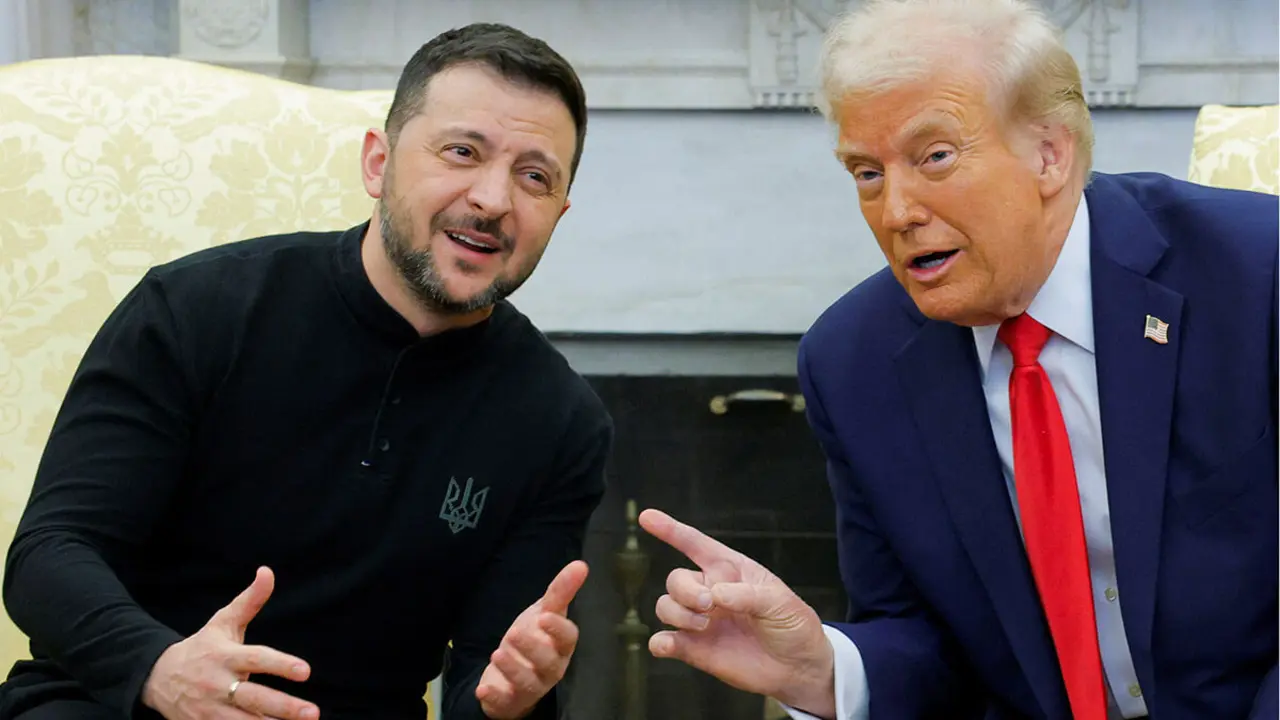Netanyahu challenges protests and maintains his controversial judicial reform

"Anyone who thinks that a real civil war, where human life is at risk, is a line we will not cross has no idea. He has no idea," insisted Isaac Herzog on Wednesday night. In a historic speech, broadcast live in prime time on all the country's television channels and radio stations, the Israeli president sounded alarm bells about the worrying turn the situation is taking. "Especially now, on the 75th anniversary of the founding of the State of Israel, we are on the brink of the abyss," he warned.
The government's judicial reform has strained institutions to the limit and brought hundreds of thousands of Israelis onto the streets to protest against the government's illiberal drift.
The coalition government headed by Prime Minister Benjamin Netanyahu, the most right-leaning in Israel's history, is pushing through a legislative package in the Knesset that would completely change the face of the judiciary. His associates claim that the amendment would limit the influence of judges on the decisions of the House. The bloc opposition, on the other hand, fears that the plan would put an end to the separation of powers. They call it a "coup d'état". These are irreconcilable positions.

The rift even affects the Israel Defence Forces (IDF). That is why the president, a ceremonial figure without executive powers, decided to intervene publicly in early March. And that is why, in the face of the executive's impassivity, he decided to do so again this week.
Herzog presented a new consensus proposal on Wednesday after consulting in recent weeks with constitutional experts, academics, lawyers and members of civil society, according to the president's office. "These are not the instructions of the president, but the instructions of the people," he would say in his speech. The Israeli head of state has also been in contact with government and opposition profiles.
"Herzog adopted the basic elements of the government's judicial reform but moderated them in various ways so that the government would not have absolute power," condenses journalist Amir Tibon in the pages of the daily Haaretz.
Yair Lapid, former Prime Minister and current opposition leader of the liberal Yesh Atid ('There is a Future' in English), welcomed the president's proposal. Israel's trade union organisation Histadrut, one of the country's most important institutions, also closed ranks with Herzog, as did the former head of government Naftali Bennett, now retired from politics. Only one government deputy, David Bitan, has spoken out in favour of freezing the measure, the rest are silent.

Netanyahu threatened to accept the president's outstretched hand, but pressure from his Justice Minister, Yariv Levin, the main promoter of judicial reform, ended up weighing more heavily. "Many parts of his proposal merely perpetuate the current status quo and do not restore the balance between the different branches of government. This is the sad truth," Bibi said on Wednesday night in response to Herzog's message.
It was the largest demonstration in Israel's history. Nearly half a million people, according to organisers, some 300,000, according to the authorities, last week swarmed Tel Aviv, the country's secular and liberal bastion, to protest against the coalition government's plans, which many describe as a judicial coup that would jeopardise minority rights. The size of the protests in a country of less than 9.5 million people is significant.
Scenes of blocked roads and clashes between police and protesters were repeated for the tenth consecutive week.
Thousands of people took to the streets on Thursday in a day dubbed National Disruption Day. The mobilisation will culminate in a large rally in Tel Aviv's Habima Square. "It is the opening of a new chapter in the history of the State of Israel: a new liberal camp has emerged that is ready to fight for the image of the state and send the Smotrichs and the Ben Gvirs [referring to the ministers of finance and public security] back under the sewer cover," argues journalist Chaim Levinson.

The coalition government's nervousness has led it to block the visit of the EU's high representative for foreign affairs and security policy, Josep Borrell. The Foreign Ministry paralysed the imminent trip to Israel of the head of European diplomacy because of his criticism of the judicial reform, which he voiced from the rostrum of the European Parliament. Eli Cohen, the Foreign Affairs Minister, expressly called Borrell to condemn the content of his statements.
The government is nevertheless maintaining its plans to vote next week on what would be the third and final reading of the judicial reform. Included in the legislative package is the so-called annulment clause, which would allow a simple majority in the Knesset, 61 of the 120 seats, to overturn rulings by the Supreme Court, the country's highest judiciary. The far-right alliance of the conservative Likud, the ultra-Orthodox Shas and United Torah Judaism parties and the radical Religious Zionism party holds 64 seats in the House.
The Supreme Court acts as a counterweight to the executive branch, balancing the power of the institutions. It is a sort of Constitutional Court in a state like Israel, which has no Constitution. Instead, there are so-called Basic Laws, a series of constitutional measures that were once designed as a draft for a future Magna Carta. They are not written and therefore not delimited. Under the government's proposed legislation, any law that a simple majority decides to define as "basic" would automatically become immune from judicial review.
Massive protest in Tel Aviv - Israel is witnessing unprecedented protests against Netanyahu’s‘judicial’ subversion of democracy. pic.twitter.com/WH8W3aPrbT
— Ashok Swain (@ashoswai) March 9, 2023
In the past, the Supreme Court has overturned some measures pushed through the Knesset, mostly related to settler activities in the occupied territories. "Since 1992, when the Basic Laws empowered the Supreme Court to exercise judicial review, the courts have invalidated legislation in 22 cases. That is, from 1995 to November 2022, the frequency with which courts invalidate legislation is about 0.8 per year," reports the Israel Democracy Institute. The data contradicts the government's main argument, which denounces the excessive interventionism of the judiciary in politics.
The legislative package would also change the process of appointing Supreme Court justices. Currently, appointments are made by a nine-member committee of politicians, other sitting judges and lawyers. This method has raised scepticism in some quarters of public opinion due to widespread suspicions of favouritism and corruption. Indeed, there seems to be some consensus on reforming the committee.
But the executive's move would de facto grant it the power to choose judges. "The proposal to abolish the Judicial Selections Committee would lead to the politicisation of the judiciary, undermine the independence of judges and change the careful balance struck through it between the branches of government," warns senior lawyer Guy Lurie at the Israel Democracy Institute.

One of the most controversial aspects of the process stands out under this heading. Netanyahu is allegedly incurring in a blatant conflict of interest. The Prime Minister is embroiled in a high-profile corruption case in which he is accused of bribery, fraud and breach of trust in a trial taking place in the Jerusalem District Court. Before this case, Bibi was a leading supporter of the Supreme Court and its method of election. But everything changed when he sat in the dock.
"Under the new rules, Netanyahu's political allies could choose the judges who will, in effect, decide his fate," explains Tibon. Levin is spearheading the reform, while Netanyahu is assured of strong backing from his coalition partners. Religious Zionism flagged up judicial reform during the election campaign to allow for the expansion of Israeli settlements, while the ultra-Orthodox Shas is expressly interested in controlling the judiciary to reposition its leader, the veteran Aryeh Deri, in the government. In February, the Supreme Court ruled that he should not serve as a minister because of his criminal record and a high-profile tax evasion case.

"The alternative to Herzog's compromise is for the Justice Minister and the chairman of the Knesset Law Committee to finish passing his laws, which are likely to be overturned by the Supreme Court," explains David Makovsky, director of the Arab Israeli relations programme at the Washington Institute of Near East Policy. A head-on clash between the highest judicial authority and the coalition government therefore seems inevitable.








